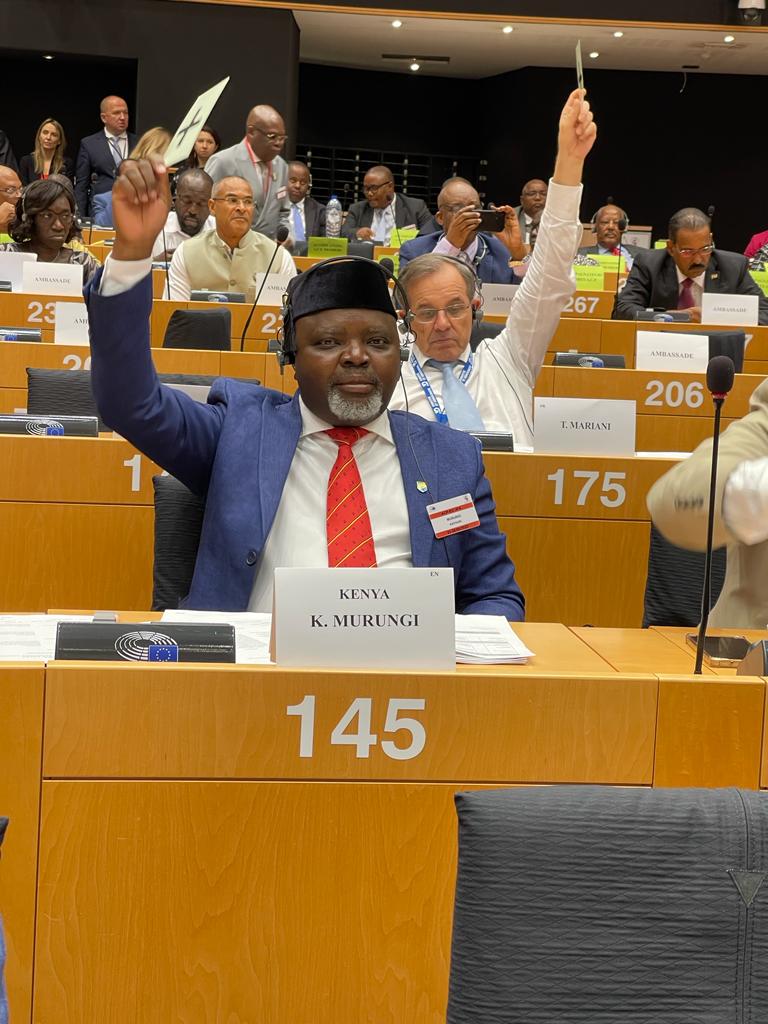𝟔𝟑𝐫𝐝 𝐎𝐀𝐂𝐏𝐒 𝐏𝐚𝐫𝐥𝐢𝐚𝐦𝐞𝐧𝐭𝐚𝐫𝐲 𝐀𝐬𝐬𝐞𝐦𝐛𝐥𝐲 𝐚𝐧𝐝 𝟒𝟑𝐫𝐝 𝐎𝐀𝐂𝐏𝐒-𝐄𝐔 𝐉𝐨𝐢𝐧𝐭 𝐏𝐚𝐫𝐥𝐢𝐚𝐦𝐞𝐧𝐭𝐚𝐫𝐲 𝐀𝐬𝐬𝐞𝐦𝐛𝐥𝐲 𝐉𝐏𝐀 𝟏𝟗𝐭𝐡-𝟐𝟖𝐭𝐡 𝐉𝐮𝐧𝐞 𝟐𝟎𝟐𝟑
A delegation from the Parliament of Kenya led by Sen. Kathuri Murungi, the Deputy Speaker of the Senate participated in the just concluded 63rd Organization of African, Caribbean and Pacific States (OACPS) Parliamentary Assembly and 43rd Organization of African, Caribbean and Pacific States (OACPS) - European Union (OACPS-EU) JointParliamentary Assembly (JPA), in Brussels, Belgium.
During the meetings of the ACP-EU Joint Parliamentary Assembly, the delay in signing of the Post Contonou Agreement came under sharp focus by Member States. The Co-Presidents of the ACP-EU Joint Parliamentary Assembly Carlos Zorrinho (S&D, Portugal) and Ana Rita Sithole (Mozambique), called upon OACPS and EU Council of Ministers to hold an emergency joint council meeting to resolve any issues that may have caused the delay and to indicate a date when the signing shall take place.
Once signed, the Post-Cotonou Agreement is expected to provide a stable, stronger and pro-active framework for the ACP-EU partnership. It will promote increased cooperation and action in peace and security, climate change and sustainable economic growth.
Among other issues highlighted at the forum is the security situation in the Democratic Republic of Congo and Sudan. With regard to the ongoing conflict in Sudan, Sen. Kathuri Murungi noted that there was need to urgently engage the warring parties to consider de-escalation, cessation of hostilities and implementation of a permanent ceasefire.
He further called for unhindered access of humanitarian support. Additionally, delegation Member, Hon. Peter Kaluma reiterated Kenya’s commitment and support in resolving conflicts in the region and in the two countries in a bid to promote peaceful dialogue for sustainable peace and stability.
The Parliamentary Assembly was also informed that the Green Deal Strategy that was adopted in 2019 and scheduled to take effect in 2023 had been rescheduled to take effect in 2025.
The Green Deal Strategy is a package of policy initiatives, which aim to set the EU on the path to a green transition, with the ultimate goal of reaching climate neutrality by 2050.
One of the policy requirements is that only products that have been produced on land that has not been subjected to deforestation or forest degradation after 31st December 2020 will not be allowed to enter the EU market or to be exported from the EU.
On a downside, the Regulations are expected to affect Kenyan coffee exports, and to some extent beef exports to the EU market as the Regulations do not recognize that many African and Global South countries are heavily forest-endowed, and, therefore, agricultural development in these countries will entail a degree of deforestation.
During the discussions Hon. Jayne Kihara, MP sought to know the steps thar the European Commission had taken to build capacity for appropriate legislative, institutional and infrastructure action for ACP countries with regard to the proposed range of regulations under the 'Green Deal Strategy'.
These include the Regulation on Deforestation-Free Products, the Directive on Corporate Sustainability Due Diligence (CSDD) as well as the Carbon Border Adjustment Mechanism (CBAM).
The JPA also discussed the need to equip TIVET Centers and offer quality education pursuant to the objectives of sustainable development goal 4, the need to include youth in decision making processes emphasising that “nothing for the youth without the youth”. The meeting also deliberated on money laundering, anti-terrorism and proliferation of arms in Member States.
Other areas of focus included the need to increase domestic revenue collection and install strong mechanisms for accountability and the need to create value addition in African countries producing critical raw materials and delocalizing industries from developed countries to developing countries with a view to eradicate poverty, develop industries, promote sustainable development and mitigate against climate change.
The 63rd OACPS Parliamentary Assembly and 43rd OACPS-EU Joint Parliamentary Assembly culminated with adoption of various urgent Motions and resolutions. In closing, Member States were called upon to exercise political will to tackle common challenges and advance the partnership.
The ACP-EU partnership dates back to 1957 when the European Economic Community (EEC) was created by the Treaty of Rome. This partnership has morphed over time from Yaounde (1963), Yaounde II (1969), first Lomé Convention (1975), George Town Agreement (1975), and the Cotonou Agreement (2000).
It Is worth noting that the Cotonou Agreement (2000) was due to expire in February 2020 and in its place a Post Cotonou Agreement signed, but this has not been the case as one Member State from the EU side is yet to sign the agreement due to some internal challenges. The Cotonou Agreement has been extended severally to avert a vacuum in the operations of the JPA. During the meeting in Brussels the Cotonou was further extended by four(4) months. Member States are hopeful that the new Agreement will be signed before the end of the year in Samoa.
















